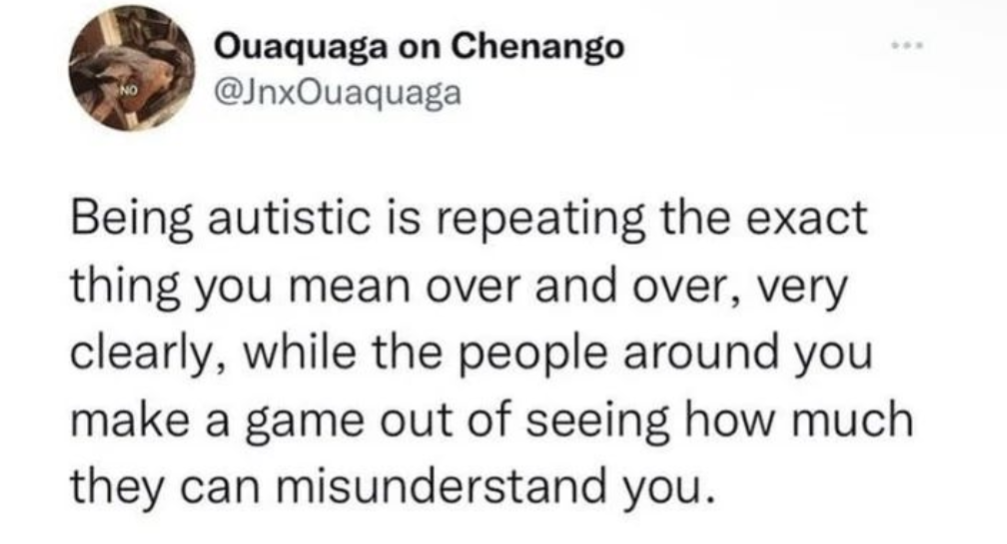this post was submitted on 27 May 2024
842 points (99.9% liked)
196
16092 readers
1720 users here now
Be sure to follow the rule before you head out.
Rule: You must post before you leave.
founded 1 year ago
MODERATORS
you are viewing a single comment's thread
view the rest of the comments
view the rest of the comments

Damn that's a lot of people declaring that THEY'RE the ones who speak clearly and THE OTHERS only think they're speaking clearly.
Brains are fairly unique to the individual. When you have an idea, this represents a unique neural activation pattern no one else has.
Being a social species, we often need to communicate these ideas to other people. This means we need to get that unique neural activation pattern into the other person's brain. That's where language comes in.
Language is a massive part of the brain that we work on our entire lives. The entire purpose of language is too make that part of our brain as close to identical as everyone else's. This way we take our idea, convert it into a neural pattern in our language center, transfer that pattern using words and non-verbal communication, then the other person receives it hopefully without massive transmission loss. They're now able to recreate the unique idea you have.
One of the defining features of autism is that the language part of the brain develops very differently in autistic people than neurotypicals. This means that neurotypicals can communicate well together. Autistic people can communicate well together. But communication between autists and NTs will be poor because of that difference.
Many people are arguing about who should change their communication to adapt to others. I don't think this is a useful question because the answer is unique to the individual and is based entirely on need. If you're an NT who needs to communicate to many people with autism, or have someone very close to you with autism, you will likely make an effort to build an autistic language map in your brain. If you're autistic and need to communicate with NTs, you'll likely build an NT language map in your brain. I can see these mapping strategies like using metaphors etc... in this very thread.
Unfortunately since autism is in the minority, there are more people in the latter group than the former. This means the pressure is felt by autistic people more than NTs. This is a natural consequence of the need to communicate in society, not an ethical dilemma. One natural consequence is that autistic people will prefer to have autistic friends to ease their communication burden.
Everyone accepts that there are people that they can't communicate well with. People who speak a different language, people with a different culture, people who have a very different life experience, people whose brassica develop differently. All these groups will have a different language sector of the brain and communication will suffer. It's not efficient for everyone to try to be able to communicate perfectly with everyone else. The goal is to be able to communicate very well with your friends and partners, communicate work concepts with colleagues, communicate basic concepts with most strangers, and avoid unintentionally making enemies with everyone else as best as you can. The onus is on each person to achieve theses goals for themselves.
There isn't really a right or wrong in this situation.
I study linguistics and a lot of different languages, and what you said made me think of how the difficulty in learning a second language depends on how different it is to our native tongue, or how accents within our own language are difficult to understand depending on how different and unfamiliar they are to us. Yet people tend to insist that certain languages are 'simply' hard, and insist that unfamiliar grammar or pronunciation 'make no sense', no matter how many millions of people use them naturally since childhood. I think it's very difficult to imagine things which are instinctive to us being anything other than immanent truths about the universe, and anything contradicting those instincts feels wrong. What is familiar feels simple and obvious, difference feels complicated and somehow malicious; it's 'unnatural'. What is natural is ourself, everything else is crazy.